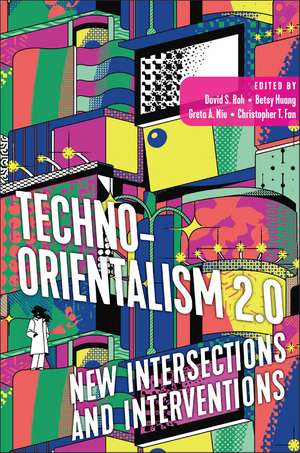Techno-Orientalism 2.0: New Intersections and Interventions: Asian American Studies Today
Editat de David S. Roh, Betsy Huang, Greta A. Niu, Christopher T. Fan Contribuţii de Justin Battin, Agnieszka Kiejziewicz, Edmond Chang, Professor Anna Romina Guevarra, Clare Kim, Won Jeon, Adhy Kim, Jung Soo Lee, Lori Kido Lopez, Kimberly McKee, Jane Park, Imran Parray, Baryon Posadas, Thomas Sarmiento, Gerald Sim, Leland Tabares, Rachel Tay, Jae Yeon Yoo, Liujia Tian, Charles Tung, Shana Yeen Limba Engleză Paperback – 15 iul 2025
Preț: 231.49 lei
Nou
Puncte Express: 347
Preț estimativ în valută:
44.30€ • 47.37$ • 36.93£
44.30€ • 47.37$ • 36.93£
Carte nepublicată încă
Doresc să fiu notificat când acest titlu va fi disponibil:
Se trimite...
Preluare comenzi: 021 569.72.76
Specificații
ISBN-13: 9781978839212
ISBN-10: 1978839219
Pagini: 334
Ilustrații: 29 color and 8 B-W images
Dimensiuni: 156 x 235 mm
Greutate: 0.45 kg
Editura: Rutgers University Press
Colecția Rutgers University Press
Seria Asian American Studies Today
ISBN-10: 1978839219
Pagini: 334
Ilustrații: 29 color and 8 B-W images
Dimensiuni: 156 x 235 mm
Greutate: 0.45 kg
Editura: Rutgers University Press
Colecția Rutgers University Press
Seria Asian American Studies Today
Notă biografică
DAVID S. ROH is a professor and chair of the Department of English at the University of Utah. He is the author of Minor Transpacific: Triangulating American, Japanese, and Korean Fictions and Illegal Literature: Toward a Disruptive Creativity , and coeditor of Techno-Orientalism: Imagining Asia in Science Fiction, History, and Media (Rutgers University Press, 2015).
BETSY HUANG is a professor of English at Clark University, Massachusetts. She is the author of Contesting Genres in Contemporary Asian American Fiction and coeditor of three essay collections: Techno-Orientalism: Imagining Asia in Speculative Fiction, History, and Media (Rutgers University Press, 2015), Diversity and Inclusion in Higher Education and Societal Contexts, and Asian American Literature in Transition, 1996–2020.
GRETA AIYU NIU is an independent scholar based in Rochester, New York, and is coeditor of Techno-Orientalism: Imagining Asia in Speculative Fiction, History, and Media (Rutgers University Press, 2015).
CHRISTOPHER T. FAN is an associate professor of English at the University of California Irvine. He is the author of Asian American Fiction After 1965: Transnational Fantasies of Economic Mobility.
BETSY HUANG is a professor of English at Clark University, Massachusetts. She is the author of Contesting Genres in Contemporary Asian American Fiction and coeditor of three essay collections: Techno-Orientalism: Imagining Asia in Speculative Fiction, History, and Media (Rutgers University Press, 2015), Diversity and Inclusion in Higher Education and Societal Contexts, and Asian American Literature in Transition, 1996–2020.
GRETA AIYU NIU is an independent scholar based in Rochester, New York, and is coeditor of Techno-Orientalism: Imagining Asia in Speculative Fiction, History, and Media (Rutgers University Press, 2015).
CHRISTOPHER T. FAN is an associate professor of English at the University of California Irvine. He is the author of Asian American Fiction After 1965: Transnational Fantasies of Economic Mobility.
Recenzii
"How do we envision the so-called threat of an impending 'Asian Century'? And, as importantly, how do we feel about it? This extraordinary sequel gives us the critical insights and imaginative tools to understand a technologically driven future that is at once terrifying and desirable."
"Whereas the original defined and limned the inner workings of an emerging mode of racial discourse, Techno-Orientalism 2.0 arrives at the apex of techno-orientalism, in a time when we are inundated with the images and imaginings of a techno-orientalist future that shape and structure our present. An electrified expansion into broader networks, this volume follows the proliferating mainstream discourse of techno-orientalism by broadening its scope, looking at our present through a sharp and unblemished lens, and venturing from the heights of our futuristic imaginations to the depths of our structured material world."
"This dazzling project marks both the extraordinary success of the first edited collection in making legible techno-orientalism as a subfield of study and the critical importance of analyzing how the conditions—of emergence, of legibility, and of future possibility—animating this subfield continue to evolve given the latest geopolitical realignments between Asia and the West. By arguing that techno-orientalism has transcended its initial focus on speculative fiction and Asiatic signifiers to develop into a 'mode of revelation,' this volume generatively shifts critical attention from subjects to structures and productively demonstrates how Asian American studies has begun to think in more geographically and conceptually expansive ways about race, genre, form, and function."
"Whereas the original defined and limned the inner workings of an emerging mode of racial discourse, Techno-Orientalism 2.0 arrives at the apex of techno-orientalism, in a time when we are inundated with the images and imaginings of a techno-orientalist future that shape and structure our present. An electrified expansion into broader networks, this volume follows the proliferating mainstream discourse of techno-orientalism by broadening its scope, looking at our present through a sharp and unblemished lens, and venturing from the heights of our futuristic imaginations to the depths of our structured material world."
"This dazzling project marks both the extraordinary success of the first edited collection in making legible techno-orientalism as a subfield of study and the critical importance of analyzing how the conditions—of emergence, of legibility, and of future possibility—animating this subfield continue to evolve given the latest geopolitical realignments between Asia and the West. By arguing that techno-orientalism has transcended its initial focus on speculative fiction and Asiatic signifiers to develop into a 'mode of revelation,' this volume generatively shifts critical attention from subjects to structures and productively demonstrates how Asian American studies has begun to think in more geographically and conceptually expansive ways about race, genre, form, and function."
Descriere
Techno-Orientalism 2.0 addresses the impact of a volatile post-COVID present on speculative futures by and about Asians. The volume engages with techno-Orientalist inflections in recent high-profile and lesser-known Asian and Asian American speculative fiction, film, television, anime, art, music, journalism, architecture, state-sponsored policy and infrastructural projects, and the now-dominant China Panic.















